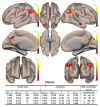Changes in Default Mode Network Connectivity in Resting-State fMRI in People with Mild Dementia Receiving Cognitive Stimulation Therapy
- PMID: 34573159
- PMCID: PMC8468883
- DOI: 10.3390/brainsci11091137
Changes in Default Mode Network Connectivity in Resting-State fMRI in People with Mild Dementia Receiving Cognitive Stimulation Therapy
Abstract
Group cognitive stimulation therapy (CST) is a 7-week activity-based non-pharmacological intervention for people with mild to moderate dementia. Despite consistent evidence of clinical efficacy, the cognitive and brain mechanisms of CST remain unclear. Theoretically, group CST as a person-centred approach may work through promoting social interaction and personhood, executive function, and language use, especially in people with higher brain/cognitive reserve. To explore these putative mechanisms, structural MRI and resting-state functional MRI data were collected from 16 people with mild dementia before and after receiving CST, and in 13 dementia controls who received treatment as usual (TAU). Voxel-based morphometry (VBM) and resting-state functional connectivity (rs-FC) analyses were performed. Compared with TAU, the CST group maintained the total brain volume/total intracranial volume (TBV/TICV) ratio. Increased rs-FC in the default mode network (DMN) in the posterior cingulate cortex and bilateral parietal cortices nodes was observed in the CST over TAU groups between pre- and post-intervention timepoints. We provided preliminary evidence that CST maintains/enhances brain reserve both structurally and functionally. Considering the role of DMN in episodic memory retrieval and mental self-representation, preservation of personhood may be an important mechanism of CST for further investigation.
Keywords: Cognitive Stimulation Therapy (CST); DMN; cognitive reserve; dementia; resting-state fMRI.
Conflict of interest statement
The authors declare no conflict of interest. The funders had no role in the design of the study; in the collection, analyses, or interpretation of data; in the writing of the manuscript, or in the decision to publish the results.
Figures


References
-
- Prince M., Comas-Herrera A., Knapp M., Guerchet M., Karagiannidou M. World Alzheimer Report 2016: Improving Healthcare for Poeple Living with Dementia. Alzheimer’s Disease International; London, UK: 2016.
-
- NICE . Dementia: Assessment, Management and Support for People Living with Dementia and their Carers. The National Institute for Health and Care Excellence (NICE); London, UK: 2018. - PubMed
LinkOut - more resources
Full Text Sources

